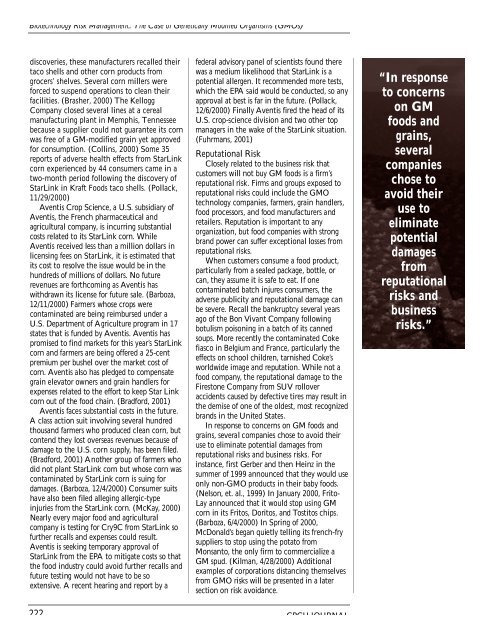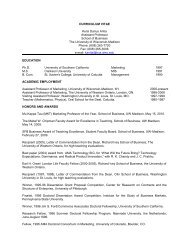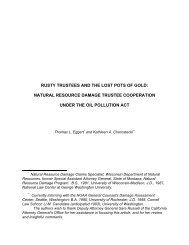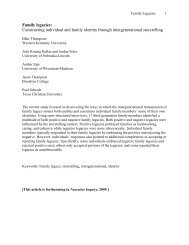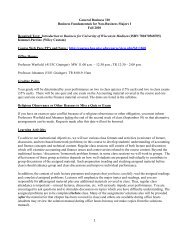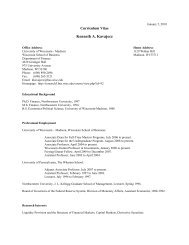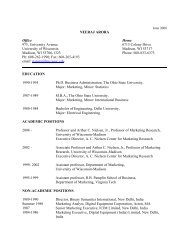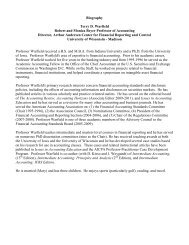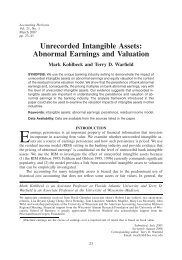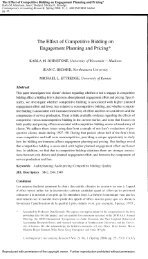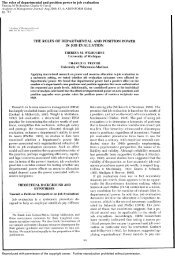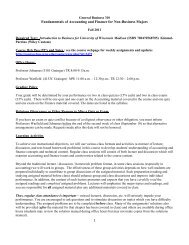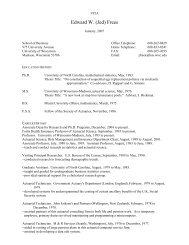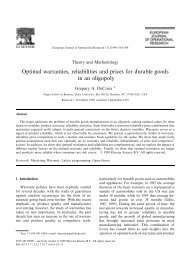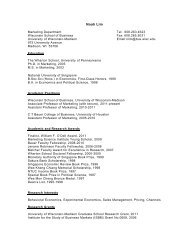by Dan R. Anderson, Ph.D.,CPCU - Wisconsin School of Business ...
by Dan R. Anderson, Ph.D.,CPCU - Wisconsin School of Business ...
by Dan R. Anderson, Ph.D.,CPCU - Wisconsin School of Business ...
You also want an ePaper? Increase the reach of your titles
YUMPU automatically turns print PDFs into web optimized ePapers that Google loves.
Biotechnology Risk Management: The Case <strong>of</strong> Genetically Modified Organisms (GMOs)<br />
discoveries, these manufacturers recalled their<br />
taco shells and other corn products from<br />
grocers’ shelves. Several corn millers were<br />
forced to suspend operations to clean their<br />
facilities. (Brasher, 2000) The Kellogg<br />
Company closed several lines at a cereal<br />
manufacturing plant in Memphis, Tennessee<br />
because a supplier could not guarantee its corn<br />
was free <strong>of</strong> a GM-modified grain yet approved<br />
for consumption. (Collins, 2000) Some 35<br />
reports <strong>of</strong> adverse health effects from StarLink<br />
corn experienced <strong>by</strong> 44 consumers came in a<br />
two-month period following the discovery <strong>of</strong><br />
StarLink in Kraft Foods taco shells. (Pollack,<br />
11/29/2000)<br />
Aventis Crop Science, a U.S. subsidiary <strong>of</strong><br />
Aventis, the French pharmaceutical and<br />
agricultural company, is incurring substantial<br />
costs related to its StarLink corn. While<br />
Aventis received less than a million dollars in<br />
licensing fees on StarLink, it is estimated that<br />
its cost to resolve the issue would be in the<br />
h u n d reds <strong>of</strong> millions <strong>of</strong> dollars. No future<br />
revenues are forthcoming as Aventis has<br />
withdrawn its license for future sale. (Barboza,<br />
12/11/2000) Farmers whose crops were<br />
contaminated are being reimbursed under a<br />
U.S. Department <strong>of</strong> Agriculture program in 17<br />
states that is funded <strong>by</strong> Aventis. Aventis has<br />
p romised to find markets for this year’s StarLink<br />
c o rn and farmers are being <strong>of</strong>f e red a 25-cent<br />
p remium per bushel over the market cost <strong>of</strong><br />
c o rn. Aventis also has pledged to compensate<br />
grain elevator owners and grain handlers for<br />
expenses related to the eff o rt to keep Star Link<br />
c o rn out <strong>of</strong> the food chain. (Bradford, 2001)<br />
Aventis faces substantial costs in the future .<br />
A class action suit involving several hundre d<br />
thousand farmers who produced clean corn, but<br />
contend they lost overseas revenues because <strong>of</strong><br />
damage to the U.S. corn supply, has been filed.<br />
( B r a d f o rd, 2001) Another group <strong>of</strong> farmers who<br />
did not plant StarLink corn but whose corn was<br />
contaminated <strong>by</strong> StarLink corn is suing for<br />
damages. (Barboza, 12/4/2000) Consumer suits<br />
have also been filed alleging allerg i c - t y p e<br />
injuries from the StarLink corn. (McKay, 2000)<br />
Nearly every major food and agricultural<br />
company is testing for Cry9C from StarLink so<br />
f u rther recalls and expenses could re s u l t .<br />
Aventis is seeking temporary approval <strong>of</strong><br />
StarLink from the EPA to mitigate costs so that<br />
the food industry could avoid further recalls and<br />
f u t u re testing would not have to be so<br />
extensive. A recent hearing and re p o rt <strong>by</strong> a<br />
federal advisory panel <strong>of</strong> scientists found there<br />
was a medium likelihood that StarLink is a<br />
potential allergen. It recommended more tests,<br />
which the EPA said would be conducted, so any<br />
a p p roval at best is far in the future. (Pollack,<br />
12/6/2000) Finally Aventis fired the head <strong>of</strong> its<br />
U.S. crop-science division and two other top<br />
managers in the wake <strong>of</strong> the StarLink situation.<br />
( F u h rmans, 2001)<br />
Reputational Risk<br />
Closely related to the business risk that<br />
customers will not buy GM foods is a firm ’s<br />
reputational risk. Firms and groups exposed to<br />
reputational risks could include the GMO<br />
technology companies, farmers, grain handlers,<br />
f o od processors, and food manufacturers and<br />
retailers. Reputation is important to any<br />
o rganization, but food companies with stro n g<br />
brand power can suffer exceptional losses fro m<br />
reputational risks.<br />
When customers consume a food prod u c t ,<br />
p a rticularly from a sealed package, bottle, or<br />
can, they assume it is safe to eat. If one<br />
contaminated batch injures consumers, the<br />
adverse publicity and reputational damage can<br />
be severe. Recall the bankruptcy several years<br />
ago <strong>of</strong> the Bon Vivant Company following<br />
botulism poisoning in a batch <strong>of</strong> its canned<br />
soups. More recently the contaminated Coke<br />
fiasco in Belgium and France, particularly the<br />
e ffects on school children, tarnished Coke’s<br />
worldwide image and reputation. While not a<br />
f o od company, the reputational damage to the<br />
F i restone Company from SUV ro l l o v e r<br />
accidents caused <strong>by</strong> defective tires may result in<br />
the demise <strong>of</strong> one <strong>of</strong> the oldest, most re c o g n i z e d<br />
brands in the United States.<br />
In response to concerns on GM foods and<br />
grains, several companies chose to avoid their<br />
use to eliminate potential damages fro m<br />
reputational risks and business risks. For<br />
instance, first Gerber and then Heinz in the<br />
summer <strong>of</strong> 1999 announced that they would use<br />
only non-GMO products in their ba<strong>by</strong> food s .<br />
(Nelson, et. al., 1999) In January 2000, Frito-<br />
Lay announced that it would stop using GM<br />
c o rn in its Fritos, Doritos, and Tostitos chips.<br />
(Barboza, 6/4/2000) In Spring <strong>of</strong> 2000,<br />
M c D o n a l d ’s began quietly telling its fre n c h - f ry<br />
suppliers to stop using the potato fro m<br />
Monsanto, the only firm to commercialize a<br />
GM spud. (Kilman, 4/28/2000) Additional<br />
examples <strong>of</strong> corporations distancing themselves<br />
f rom GMO risks will be presented in a later<br />
section on risk avoidance.<br />
222 <strong>CPCU</strong> JOURNAL<br />
“In response<br />
to concerns<br />
on GM<br />
foods and<br />
grains,<br />
several<br />
companies<br />
chose to<br />
avoid their<br />
use to<br />
eliminate<br />
potential<br />
damages<br />
from<br />
reputational<br />
risks and<br />
business<br />
risks.”


